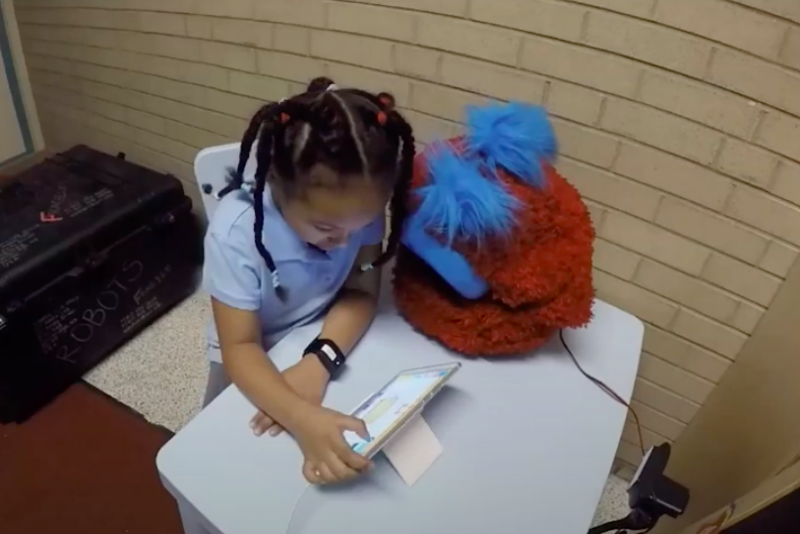Learning with — and about — AI technology
At Open Learning Talks, Cynthia Breazeal and Eric Klopfer discuss artificial intelligence education.

Between remote learning, more time spent at home, and working parents trying to keep their kids occupied, children across the United States have clocked in record-breaking hours of screen time during the pandemic. Much of it is supervised and curated by teachers or parents — but increasingly, kids of all ages are watching videos, playing games, and interacting with devices powered by artificial intelligence. As head of the Personal Robots group and AI Education at MIT, Media Lab Professor Cynthia Breazeal is on a mission to help this generation of young people to grow up understanding the AI they use.
At “AI Education: Research and Practice,” an Open Learning Talks event in December, Breazeal shared her vision for educating students not only about how AI works, but how to design and use it themselves — an initiative she calls AI Literacy for All. The AI Education project Breazeal is leading at MIT is a collaboration between MIT Open Learning and the Abdul Latif Jameel World Education Lab, the Media Lab, and the MIT Schwarzman College of Computing. Through research projects, hands-on activities, and scalable learning modules, Breazeal and her AI Education affiliates across MIT are creating a robust resource hub for educators, parents, and learners of all ages to understand how AI functions in different day-to-day roles, and how to approach both using and creating artificial intelligence with a basis in ethics, inclusion, and empathy.
“It’s at this intersection of human psychology, engagement, and AI and technology, and we’re learning a lot,” Breazeal said as she explained her group’s research to the audience. “We’re not trying to build technologies to replace teachers or compete with parents. These are fluffy, pet-like robots, but they can engage children in this interaction where there are aspects like a motivating ally, like a friend ... there are aspects like this companion animal, and this nonjudgmental companion animal gives the nature of this relationship this very different flavor, where even if they’re embarrassed to make mistakes in front of their teacher or their friends, they seem not to be in front of the robot — and you can’t learn if you’re not willing to take learning risks.”
Breazeal shared examples from her Personal Robots group’s efforts, including recent studies on personalized learning companions for early childhood education, developing comprehensive K-12 AI literacy programs, and creating tools to help kids get creative using AI technologies.
“So how do you empower kids to create things with AI? You’re not going to put a middle-schooler on Tensorflow and say ‘Good luck,’ right?” Breazeal said. “MIT is the home base for things like Scratch and App Inventor, so the team is taking these more advanced AI methods and curricula and concepts, and augmenting these platforms to empower kids to use these AI technologies, to learn about them and then design projects of their own, and port them to different kinds of platforms.”
Host Professor Eric Klopfer, director of the Scheller Teacher Education Program and the Education Arcade at MIT and head of MIT Comparative Media Studies and Writing, engaged Breazeal in a dialogue about all aspects of AI education and fielded questions from the live audience, ranging from emotional connection with robots to screen time, data collection, and representation in research and design.
“How does AI in education narrow the gap that we see between socioeconomic groups? How do we see AI bridging that gap rather than widening the gap?” asked Klopfer, as he and Breazeal shared insights on training teachers, providing hands-on activities and paper prototyping to expand access and inclusion on technology education. “The technology itself is not the impetus for the divide anymore; it’s the way the technologies are being used, and the way people are trained to be able to use them,” Klopfer said. “It’s so key that we don’t repeat our mistakes from past technological innovations, where we just distribute devices to schools without thinking about the training and expertise that needs to go with that.”
And in an increasingly tech-driven society, access and education are key to creating equity for, and encouraging thoughtful participation from, all users. “We want a much more diverse, inclusive group of people being able to participate in shaping this future [with AI],” said Breazeal.
Launched last fall, Open Learning Talks is a public, online event series that features conversations between leaders from MIT and around the world, sharing their research and insights on education, teaching, and the science of learning. Upcoming events include William Bonvillian and Sanjay Sarma discussing their new book, “Workforce Education,” on Feb. 23; and Professor D. Fox Harrell and Rocky Bucano, executive director of the Universal Hip Hop Museum, in mid-March.





































